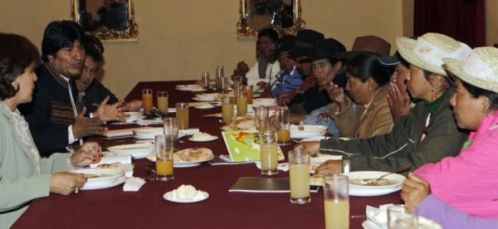|
On Friday, October 21 at Plaza Murillo, President Evo Morales met with the indigenous people who have been protesting against the plan to construct a highway through their pristine ancestral land from Bolivia to Brazil. 2000 indigenous from the Isiboro-Secure Indigenous Territory and National Park, known as TIPNIS arrived in Plaza Murillo, La Paz for negotiations with the government on Wednesday, October 19. The marchers then elected a delegation to meet with the president. TIPNIS covers 1.2 million hectares (about 3 million acres or 4600 square miles) with 15,000 inhabitants. Before he met with them on October 21, President Morales sent a request to Congress to modify a law that would have cut through these lands. He requested new language in the law that will prohibit the planned highway, or any other highway, from being built through jungle low in the Bolivian Amazon. Morales also asked the congress to make the land "intangible," i.e. to protect it from other development and from settlers who are not indigenous. Indigenous legislator, Pedro Nuni responded to the president's decision, "I'm pleased that the president has reaffirmed the path of the defense of Mother Earth. I congratulate him for his determination." Plans to build a highway from Bolivia to Brazil has not been completely abandoned but it will not cut through Bolivia's Isiboro-Secure territory and national park. The highway is important to both, the Bolivian and Brazilian economies, opening a trade route between the two countries and connecting Brazil to Chilean and Peruvian highways to Pacific Ocean ports. Cost estimates for the construction are of the road are to be partially funded ($330-$415 million) by the Brazilian National Bank for Economic and Social Development. Most of the construction is to be done by a Brazilian company and apparently the Bolivian-Brazilian contract for construction will have to be renegotiated. The government's assent is refreshing in a world where the money often rules over the value of human beings, their culture and the earth itself. Morales was under tremendous pressure among concerns for the environment, the people and Bolivia's economic needs. But he heard the voice of the people, acceded to their demands even over financial considerations and an international agreement, demonstating his commitment to Bolivia's thriving democracy. In the video shown below, TeleSur reports news of the arrival of the marchers and President Morales' agreement to negotiate with them on the following day. - Les Blough in Venezuela Sources: TeleSur and News Agencies October 20, 2011
|
